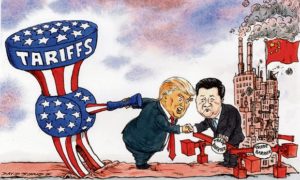by WorldTribune Staff, April 10, 2017
Because China relies on the United States much more than the U.S. depends on China, President Donald Trump “holds the important cards” in the relationship and he played them skillfully in last week’s summit with Chinese President Xi Jinping, analysts say.
“Xi clearly hopes that Trump can be talked down from the aggressively anti-Beijing stance he adopted on the campaign trail, and arrived for his talks armed with a few vague promises about future Chinese investment in the U.S.,” The Guardian noted on April 9.

“This is not going to be enough to satisfy Trump, who has made action on America’s $350bn a year trade deficit with China a touchstone of his presidency.”
Nearly 4 percent of China’s GDP comes directly from exports to the U.S., while the equivalent figure for the US is less than 1, the Guardian noted.
“There are several other countries that could provide the U.S. with the manufactured goods it gets from China, but China would have real trouble finding an alternative to the U.S. as an export market.”
The Chinese leadership “is keen to avoid the social and political unrest a trade war with the U.S. would inevitably bring,” said Brian Davidson of the U.S.’s Fathom consultancy.
“The U.S. position in these trade negotiations is strengthened by international trade law, and by China’s systematic violation of obligations under World Trade Organization rules,” Davidson said. “The U.S. has scope to open, and win, lawsuits against China at the WTO, a point not lost on both leaders.”
Meanwhile, Beijing “has been left guessing about what it will actually take to stop Trump slapping a 45 percent tariff on all Chinese exports,” the Guardian noted. “The answer is that it will probably require Xi to remove the barriers that make it hard for hi-tech U.S. companies to export to China. Even then, there is likely to be some U.S. protectionism in sectors – such as steel – that are politically sensitive in the rust-belt states that carried Trump to victory.
“There will be less talk in the months ahead of China ‘raping’ the U.S., but that simply means the current occupant of 1600 Pennsylvania Avenue has learned from one of his predecessors, Teddy Roosevelt, to speak softly and carry a big stick.”
